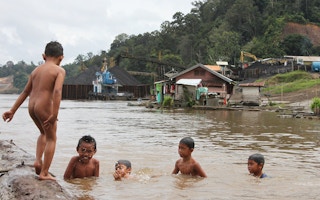Indigenous activists in Indonesian Borneo have scored a big win in a lawsuit against a coal mining firm that sought to operate on their land.
After a two-year court battle, Indonesia’s Supreme Court ruled in favour of a lawsuit that claims the permit for the mining firm, Indian-owned PT Mantimin Coal Mining (MCM) should be revoked.
The national government granted the firm a permit in December 2017 to operate in the district of Central Hulu Sungai in South Kalimantan province. The issuance of the permit surprised local activists as well as local government officials, who had for decades opposed mining and plantation projects in the district. Central Hulu Sungai is the sole district in the province that remains free of both coal mining and oil palm plantations.
With help from Walhi, Indonesia’s largest environmental NGO, local residents took MCM and the minister of energy and mineral resources to court, arguing the permit bypassed a critical step: the environmental impact assessment, which requires local approval.
In parallel to the lawsuit, opponents of the mine mobilised a movement, operating online with the hashtag #SaveMeratus in honour of the region’s rainforested Meratus Mountains, and organising the delivery of more than 1,000 handwritten letters to President Joko Widodo.
“The Supreme Court’s ruling in favor of Walhi’s claim is a win for and with the people, and now almost everyone supports the #SaveMeratus movement,” said Kisworo Dwi Cahyono, the head of Walhi’s South Kalimantan chapter.
“
The Supreme Court’s ruling should be further encouragement in the struggle to save the Meratus Mountains from other mining permits.
Kisworo Dwi Cahyono, director South Kalimantan chapter, Walhi
United local resistance
Similar land conflicts have occurred throughout Indonesia, but Central Hulu Sungai is unique as local officials have stood alongside indigenous residents in their unwavering opposition to mining projects on their land, Kisworo said.
“The people of Central Hulu Sungai have already agreed that government long-term plans should protect forests, so that we can prosper with agriculture and ecotourism and without mines and palm oil,” said the district’s environment office head, Muhammad Yanni.
The 51,800-hectare (128,000-acre) Meratus Mountains are home to indigenous villages and forests, but mines and plantations have been making their way up the slopes for decades. Central Hulu Sungai district has refused entry to mines and plantations that have otherwise found concessions elsewhere in Borneo.
If the mine project were to go forward, it would help fuel Asia’s coal-power boom while operating next to villages that still lack 24-hour electricity.
More than half of the would-be mining area is a forested water catchment area as well as a river surrounded by several karst towers that stretched the length of the mountains and provided sources of livelihood and water for the surrounding 8,000 residents.
“The area is vital because it’s the source of water for agriculture, drinking, and fishing,” Kisworo said.
Part of the 2,000-ha (5,000-acre) concession area overlaps with village forest that the central government granted autonomy in 2017 and designated for beekeeping, farming, fishing, horticulture, and ecotourism.
“If the river is damaged, food security will be, too. If it is mined, as we see from other districts’ mines, the water will turn acidic and fish will die,” said Sunarwiwarni, head of the district office for food and fisheries security.
As a foreign company, PT MCM receives operating permits from Jakarta; local companies get theirs from district and provincial governments. PT MCM was granted its permit in Central Hulu Sungai because of a 2017 mining ministry regulation that allowed the company to advance multiple concessions through the licensing process as if they were one concession.
Walhi’s lawsuit argued that this regulation allowed MCM and the ministry to bypass the requirement to provide an environmental impact assessment, which the district government, standing alongside local residents, retained as its shield against unwanted companies.
PT MCM has been called a ghost company, as officials in the district, provincial and central governments said they did not meet any of its representatives before the permits were granted.
Twice the lawsuit attempting to get PT MCM’s permit revoked was filed with Jakarta courts. The first time, in July 2018, a lower court’s examination of the case included a visit to the proposed mining area.
The court refused to hear both the lawsuit and its appeal due to technicalities, so Walhi filed it with the country’s highest court in April 2019. Residents had already begun agreeing to receive compensation for giving their land to PT MCM.
The court’s decision came on Oct. 15, 2019, but Walhi only discovered the decision in January, via a post on the court’s website. The group has yet to receive a copy of the court’s decision, in which the judges’ reasoning should be made clear.
The court has ordered that PT MCM’s operating permit be rescinded, but the Ministry of Energy and Mineral Resources has yet to do so. (In Indonesia’s judicial system, court rulings are not immediately actionable; all parties in a lawsuit must confirm receipt of a written copy of the verdict before being required to act on it.) In its lawsuit, Walhi had also demanded that the ministry and PT MCM cover all legal and court fees related to the lawsuit.
Walhi’s win doesn’t mean the #SaveMeratus movement is over, Kisworo said in a press release. The mountain range is the province’s “roof,” he said, and half of the province’s land is covered in oil palm plantations or mines.
“The struggle has been long, and it will continue to be long. The Supreme Court’s ruling should be further encouragement in the struggle to save the Meratus Mountains from other mining permits.”
This story was published with permission from Mongabay.com.

















